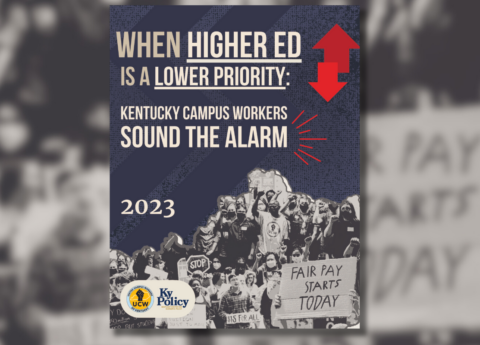The President’s proposal to cover two years of community college tuition for students would help thousands of Kentuckians earn college degrees and take advantage of the resulting job opportunities. And unlike much of the state’s financial aid—as well as Tennessee’s free community college program—the proposal would benefit low-income adults, an important population needing greater access to higher education.
The proposed program would provide funding for three-quarters of the average cost of community college, with participating states picking up the remaining tuition costs. The federal funds for the program would come from the money raised by the President’s new tax proposals. In order to qualify, students would need to attend at least half time and maintain a 2.5 GPA. Only tuition at community colleges is covered; the first two years of tuition at a four-year public university do not qualify, although students will be able to transfer community college credits to four-year institutions.
The President’s proposal would include adult students who have earned a GED or previously graduated from high school. This is different from the new Tennessee Promise program, apparently an inspiration for the President’s proposal, which eliminates tuition and fees at community college only for students enrolling right out of high school. According to census data, 571,215 of Kentucky adults ages 25 to 54 (32.5 percent) had only a high school degree or GED in 2012—and 400,375 (22.8 percent) had some postsecondary education but no degree.
In addition, the President’s program would cover all students’ tuition without taking into account other forms of financial aid. This means that low-income students could use Pell funds to cover the considerable additional costs of college—i.e., housing, books and the costs associated with reducing work hours to attend school. The estimated cost of in-state full-time attendance at a Kentucky Community and Technical College System (KCTCS) institution in 2013-2014 was $14,282: $3,456 for tuition; $1,000 for books and supplies; $6,976 for housing; $800 for personal expenses; and $2,050 for transportation. The maximum Pell grant that year would cover just 40 percent of the estimated cost of attendance. In contrast, Tennessee’s program pays just the balance for tuition and fees once other financial aid, such as Pell grants, is taken into account, meaning it doesn’t provide much or any help to many low-income students.
Financial barriers are a key reason that community college students do not attend or graduate from college. According to a 2012 national Community College Survey of Student Engagement, KCTCS students consider lack of finances to be the issue most likely to cause them to withdraw from college. And higher education in Kentucky—even at the state’s community colleges—is far from affordable for many. Low-income students who receive Pell are more than twice as likely to be in debt as those who do not qualify for Pell—and to have greater debt.
Another significant aspect of the President’s proposal is that it applies both to students attending college half-time and those enrolled full-time. This is important as low-income adults are more likely than traditional-aged college students to attend part-time due to work and family responsibilities. However, it does not cover students who attend college less than half-time, which many low-income adults do.
In order to participate in the proposed program, Kentucky would have to come up with some of the funds—probably about $600 per full-time student—while continuing the state’s existing investments in higher education. But the benefits would be substantial—especially given expected growth in some middle-skills jobs in the state, which require education beyond high school but not a four-year degree, and the higher wages associated with earning a postsecondary degree. A study by the University of Kentucky’s Center for Business and Economic Research shows that the benefits of a KCTCS education across the state include increased earnings for individuals as well as public returns such as improved health and crime reduction. The study finds that having a degree from KCTCS is associated with a $245,000 increase in lifetime earnings over having just a high school degree.



